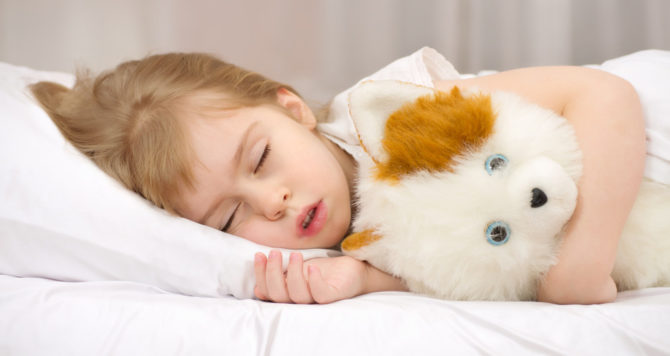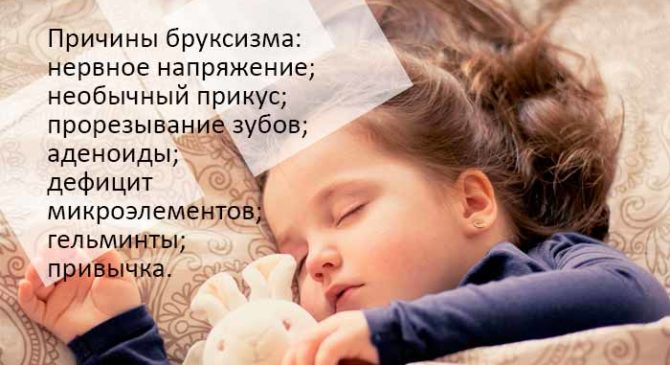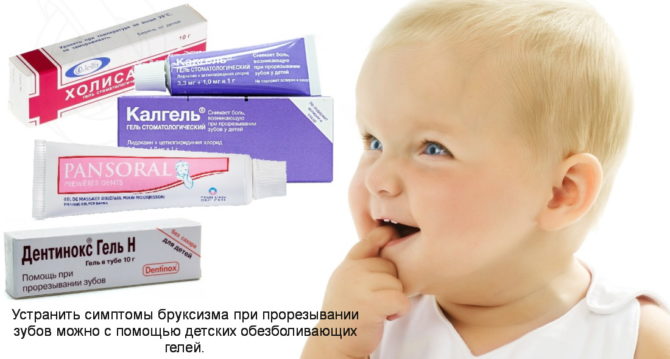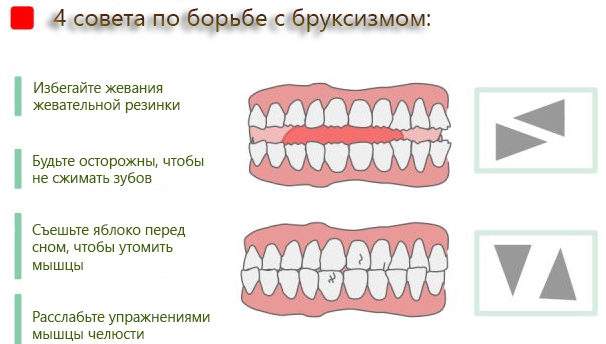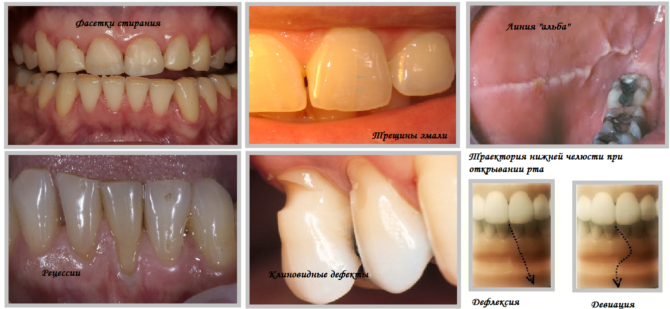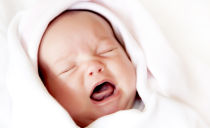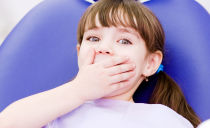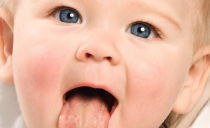The child creaks and grinding his teeth in his sleep: causes and methods of treatment
Many mothers say that their children strangely grind their teeth. This pathological manifestation is called bruxism. Dentists, neurologists and somnologists work on the study of the phenomenon. So far, doctors have not formed a consensus on whether to consider it a disease or not.
But since bruxism can cause dental and neurological problems, it definitely needs to be treated. And since there are many reasons why children grit their teeth in a dream, at the first manifestations you should visit the clinic for a competent diagnosis.
Content
Factors and causes of bruxism
In most cases, children grit their teeth in their sleep, and not while awake. The fact is that the involuntary contraction of the masticatory muscles, which is observed with hypertonicity, leads to rattle. When the baby is sleeping, he cannot control the position of the jaw and suppress its closure by willpower.
Teeth grinding sooner or later appears in 50% of children. The following pathologies contribute to this:
- nervous experiences;
- heredity;
- sleep disturbance;
- diseases of the nasopharynx;
- abnormal development of the jaw;
- some internal pathologies;
- teething of the first incisors.
Dr. Komarovsky’s answer regarding teeth grinding in a dream:
Nervous stress, stress
Kids acutely experience various shocks, so psychological stress can provoke gnashing of teeth in some children in a dream.
A pathological manifestation caused by a negative emotional state is observed both during sleep and during wakefulness. However, during the day, children manage to control the position of the jaw. When the baby sleeps, control weakens.
In this case, bruxism is promoted by:
- conflict with peers;
- change of kindergarten or educational institution;
- excessive mental stress;
- dysfunctional situation in the family;
- increased animation before bedtime;
- Long pastime for computer games;
- noisy celebrations;
- excommunication of the baby from breastfeeding.
If the child knocks with his fingers, especially if the knock is heard often, it is worth reducing him to a neurologist and psychologist. This is one of the signs of emotional stress. Often it manifests itself simultaneously with bruxism.
Teething
The teething of the first incisors in one-year-old babies is almost always accompanied by pain and severe itching. Little children try to scratch the inflamed gums, and the most convenient way to do this is to rub the disturbing area against the lower or upper jaw. As a result, the child bites his teeth.
After teething all the baby teeth in the baby, parents can breathe quietly, as bruxism ceases to bother their baby. A repeated manifestation of the pathology can occur at the age of 5-6 years, when temporary incisors begin to change to permanent ones.
Heredity
The answer to the question why a child grinds his teeth at night can be heredity. In the course of numerous studies, it was found that if at least one of the parents suffers from bruxism, the risk is high that it will manifest itself in the baby.
Most often, the grinding of the inherit boys.However, the pattern of genetic predisposition has not been fully studied; therefore, it is impossible to state this fact with certainty.
Sleep disturbance
If a child grinds his teeth neither late at night, but closer to morning, the cause of this phenomenon may be a pathological sleep disorder. Usually it manifests itself during the dream phase, when the muscles twitch, and the eyes actively move. At such minutes, children experience changes in blood pressure, pulse and respiration.
The young body needs a full sleep. If a child falls asleep problematically, often shudders, is constantly in a sleepy state, wakes up from nightmares, then it is necessary to take him to a neurologist. Otherwise, in the future he will face problems with the nervous system.
Disorders in the nasopharynx or abnormal development of the jaw
Sometimes, to find out why a child is grinding his teeth in his sleep, you need to visit an otolaryngologist. Pathology can develop due to inflammation of the adenoids, against which the patency of the nasal airways is impaired. Gnashing in this case will manifest itself continuously and for a long time, rather than short bouts.
In children older than three years of age, squeaking can be observed due to the presence of an incorrect bite. Crooked or oblique growing teeth, tightly touch and rub against each other, because of which there is a grinding sound.
Epilepsy
Sometimes doctors may recommend examining a baby for epilepsy. This decision is made on the basis that epileptic seizures are invisible to others. Sometimes only gritting your teeth is a symptom of an attack. Therefore, to confirm or refute this hypothesis, an ECHO-encephalogram is performed, computed tomography or another study.
Helminthiasis
Since ancient times, people believed that if a small child grinds his teeth at night while in a state of sleep, then he has helminthiasis - a parasitic disease. Many are still in a hurry to the pharmacy for anthelmintic, it is worth their baby gnash a tooth. However, during statistical studies it was found that bruxism is diagnosed both in children with worms and in healthy ones. Parasites cannot cause this anomaly..
Other reasons
In addition to all these factors, grinding teeth can provoke:
- vegetative-vascular diseases;
- impaired thermoregulation in the child's body;
- lack of amino acids or calcium;
- colds or general tiredness;
- weaning, during which the baby experiences a very stressful situation, and a sucking reflex triggers.
Gnashing of teeth in the daytime
It happens that parents ask for help, because the child grinds his teeth very hard during the day. In this situation, you need to make sure that the pathological phenomenon is not observed at night. If the assumption is confirmed, then, rather, it is just a bad habit. So, you just need to wean the baby from gnashing.
There are 2 ways out:
- resort to punishment, because the stories that he damages the enamel will not be relevant, especially if the child is only 2-3 years old;
- ignore the situation and wait until the baby forgets about the addiction.
If parents choose the option of ignoring, then they must be sure that the baby grinds his teeth for no serious reason and slightly, since such actions may cause thinning of the enamel and damage to the teeth.
Actions to detect bruxism
In childhood, especially in a one-year-old, pathology usually does not lead to health consequences. With the advent of the entire permanent dentition, the rattle should not be repeated. However, if the crumbs have a headache or the teeth begin to wear out, it is necessary to consult a dentist for help.
The same should be done if episodes of bruxism last longer than 30 seconds and occur more than twice a day.In just a few months after the onset of such attacks, the child’s enamel will thin out and the gums will become inflamed.
If a child grinds his teeth in his sleep, parents should not do anything on their own. For the correct diagnosis of the pathology that caused the negative phenomenon, and the appointment of competent treatment, you can and should visit three specialists:
- The first is a therapist. He will prescribe the necessary tests, select a vitamin complex, and give directions to other doctors. If the cause of bruxism is still in helminthiasis, then the whole family will need to do the appropriate tests.
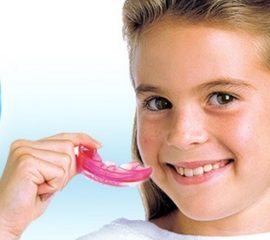 The second is the dentist. The doctor will determine the condition of the gums and teeth, whether they should be treated. If the manifestation is very pronounced, he will prescribe the use of cap, which will prevent the erasure of enamel. Some patients will need to do the correction of orthodontic pathologies. For babies who have incisors, the doctor will prescribe special gels and solutions that reduce inflammation and alleviate the condition. Dentistry "will come to the rescue" even after the elimination of bruxism, since it will be necessary to remove the consequences of the disease.
The second is the dentist. The doctor will determine the condition of the gums and teeth, whether they should be treated. If the manifestation is very pronounced, he will prescribe the use of cap, which will prevent the erasure of enamel. Some patients will need to do the correction of orthodontic pathologies. For babies who have incisors, the doctor will prescribe special gels and solutions that reduce inflammation and alleviate the condition. Dentistry "will come to the rescue" even after the elimination of bruxism, since it will be necessary to remove the consequences of the disease.- The third is a neuropathologist. If the cause of the rattle was an emotional disorder, the treatment course will include taking soothing medications, taking relaxing baths, aromatherapy, exercise, and regular walks.
It doesn’t matter at what time the child grit his teeth: in a dream or during wakefulness - in both cases, you need to consult a specialist. Parents need to understand that rattle can cause serious health problems.
Bruxism is treated for several months, and sometimes longer. During this time, the enamel can significantly thin out, so therapy must be started at the first manifestations of the ailment.

